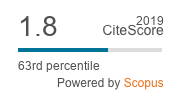The policies of social welfare produced effects in performance of the company? Comparative analysis of European companies
Abstract
Purpose: The aim of this paper is to study and analyze the public well being policies and its repercussions in the efficacy and efficiency of the companies that give services to dependant people (CNAE 87 and 88 Codes).
Design/methodology/approach: For the making of the present study several companies which gives services in countries with different patterns when applying public well being policies have been compared.
These countries have been Spain, Germany, UK and Netherlands. The data has been obtained through AMADEUS. The period of the study has been 2008-2012. The variables used are the operating margin (OMR) rate and the rotation assets rate (RAT).
Findings and Originality/value: From the results obtained we have not been able to establish a significant statistic relationship between Companies behaviour and public well being policies.
Originality/value: Up to date few extracts have been done, in Spain, about the financial behaviour of the companies which give services to the elderly. The business development entails an economic growth which balances with the cost inherent in the elderly population.Keywords
Full Text:
PDF[es]DOI: https://doi.org/10.3926/ic.545
This work is licensed under a Creative Commons Attribution 4.0 International License
Intangible Capital, 2004-2024
Online ISSN: 1697-9818; Print ISSN: 2014-3214; DL: B-33375-2004
Publisher: OmniaScience








